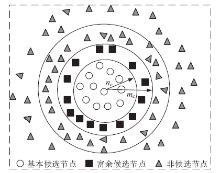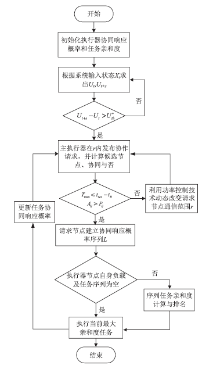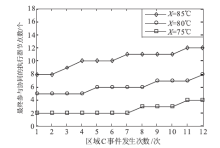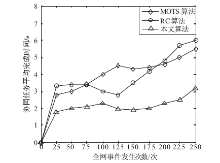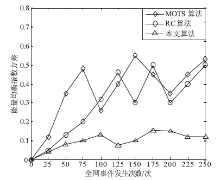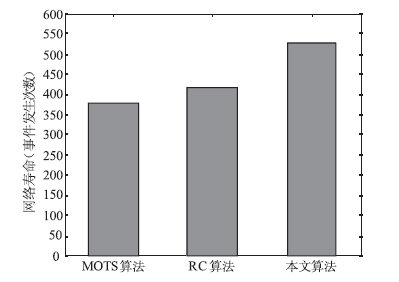信息网络安全 ›› 2018, Vol. 18 ›› Issue (8): 8-9.doi: 10.3969/j.issn.1671-1122.2018.08.002
WSANs中基于生物免疫机制的A-A智能协同方法
- 江南大学物联网技术应用教育部工程研究中心,江苏无锡 214122
-
收稿日期:2018-03-10出版日期:2018-08-20发布日期:2020-05-11 -
作者简介:作者简介:王艳(1978—),女,江苏,教授,博士,主要研究方向为网络化控制系统、无线传感器网络;潘琛(1988—),女,河南,硕士研究生,主要研究方向为无线传感器网络协同控制。
-
基金资助:国家自然科学基金[61572238];国家高技术研究发展计划(863计划)[2014AA041505];江苏省杰出青年基金[BK20160001]
An A-A Intelligent Collaborative Method Based on Biological Immune Mechanism in WSANs
- Engineering Research Center of Internet of Things Technology Applications, Ministry of Education, Jiangnan University, Wuxi Jiangsu 214122, China
-
Received:2018-03-10Online:2018-08-20Published:2020-05-11
摘要:
文章受生物免疫机理启发,提出一种基于生物免疫机制的A-A智能协同方法。该方法以求解系统最大约束时间及参与协同的执行器节点数为目标,在任务协作时间模型中引入状态预测函数得出系统最大约束时间。在选择节点协同处理任务时,运用生物免疫机理求解最终参与协同的执行器节点数。在功率控制技术协助下,执行器节点可动态改变协同范围并自主决策优势执行器节点参与任务处理,让优势候选执行器节点有更多的机会参与协同工作,实现了任务与执行器节点的高效匹配,解决了能耗不均衡问题,延长了网络寿命。仿真结果表明,文中算法相比典型的RC和MOTS算法,任务平均完成时间明显减少,网络寿命明显提高。
中图分类号:
引用本文
王艳, 潘琛. WSANs中基于生物免疫机制的A-A智能协同方法[J]. 信息网络安全, 2018, 18(8): 8-9.
Yan WANG, Chen PAN. An A-A Intelligent Collaborative Method Based on Biological Immune Mechanism in WSANs[J]. Netinfo Security, 2018, 18(8): 8-9.
使用本文
| [1] | Gong Wanwan, Liu Shixing, Feng Tingting.The Platform Design of Smart-house Based on Wireless Sensor Networks[J]. Netinfo Security, 2015, 15(3): 79-83. |
| 龚婉婉,刘士兴,冯婷婷. 基于无线传感器网络的智能家居监控平台设计[J]. 信息网络安全,2015,15(3):79-83. | |
| [2] | YAN Ke, LUO Guangchun, TIAN Ling, et al. Hybrid Connectivity Restoration in Wireless Sensor and Actor Networks[EB/OL]. . |
| [3] | SU Binting, FANG He, XU Li.Q-Learning-based Routing Protocol for the Balance of WSN Lifetime[J]. Netinfo Security, 2015, 15(4): 74-77. |
| 苏彬庭,方禾,许力. 基于Q-Learning的无线传感器网络生命周期平衡路由[J]. 信息网络安全,2015,15(4):74-77. | |
| [4] | ZHANG Li.Collaboration Mechanism and Algorithm Research in Wireless Sensor and Actor Network[D]. Wuhan: Wuhan University of Technology, 2007. |
| 张丽. 无线传感执行网络中协作机制及算法的研究[D]. 武汉:武汉理工大学,2007. | |
| [5] | YI Jun, TANG Yunjian, LI Taifu.Load-balanced Data Gathering and Task Collaboration Algorithms for Wireless Sensor and Actor Networks[M]. Beijing: Electronic Industry Press, 2014. |
| 易军,唐云建,李太福. 无线传感器/执行器网络数据汇集及任务协作算法研究[M]. 北京:电子工业出版社,2014. | |
| [6] | YI Jun, SHI Weiren, XU Lei.Multi-objective Task Scheduling for Wireless Sensor and Actor Networks[J]. Control & Decision, 2011, 26(2): 191-195. |
| [7] | ATAKAN B, AKAN O B.Bio-Inspired Cross-Layer Communication and Coordination in Sensor and Vehicular Actor Networks[J]. IEEE Transactions on Vehicular Technology, 2012, 61(5): 2185-2193. |
| [8] | DU Jipeng, ZHOU Ling, QU Peng, et al.Task Allocation in Multi-agent Systems with Swarm Intelligence of Social Insects[C]//IEEE. 6th International Conference on Natural Computation, August 10-12, 2010, Yantai, China. New Jersey: IEEE, 2010: 4322-4326. |
| [9] | WANG Yan, JI Zhicheng.Bio-inspired Collaborative Method for Wireless Sensor and Actor Network[J]. Control Theory & Applications, 2014, 31(2): 188-194. |
| 王艳,纪志成. 生物启发的无线传感执行网络协同方法[J]. 控制理论与应用,2014,31(2):188-194. | |
| [10] | DING Yongsheng, CHEN Rui, HAO Kuangrong.A Rule-driven Multi-path Routing Algorithm with Dynamic Immune Clustering for Event Driven Wireless Sensor Networks[J]. Neurocomputing, 2016, 203(C): 139-149. |
| [11] | CHEN Yanjun, PAN Quan, LIANG Yan, et al.Decentralized Collaborative Self-organization Algorithm Based on Information Content[J]. Control Theory & Applications, 2011, 28(10):1391-1398. |
| 陈延军,潘泉,梁彦,等. 基于信息量的分布式协同自组织算法[J]. 控制理论与应用,2011,28(10):1391-1397. | |
| [12] | PENG Jun, LIU Ya, WU Min, et al.Dynamic Collaboration Algorithm in Multi-agent System Based on State Prediction[J]. Journal of System Simulation, 2008, 20(20): 5511-5515. |
| 彭军,刘亚,吴敏,等. 基于状态预测的多智能体动态协作算法[J]. 系统仿真学报,2008,20(20):5511-5515. | |
| [13] | YANG Pengcheng, SHEN Yanbin, LUO Yaozhi.Active Structures Integrated with Wireless Sensor and Actor Networks: a Bio-inspired Control Framework[J]. Journal of Zhejiang University-Science A, 2016, 17(4): 253-272. |
| [14] | KHAN S, LLORET J, MACIAS-LÓPEZ E. Bio-inspired Mechanisms in Wireless Sensor Networks[EB/OL]. . |
| [15] | WANG Yuna, LV Qiuyun.A New Network Authentication Scheme Based on Biometric Recognition[J]. Netinfo Security, 2014, 14(8): 1-5. |
| 王毓娜,吕秋云. 基于生物识别的网络身份认证新方案[J]. 信息网络安全,2014,14(8):1-5. | |
| [16] | YI Jun, LI Taifu, XU Lei.Power Control-based Task Bidding Strategy for Wireless Sensor and Actor Networks[J]. Journal of Huazhong University of Science & Technology(Natural Science Edition), 2011, 39(4): 33-36. |
| 易军,李太福,许磊. 基于功率控制的传感反应网络任务招标策略[J]. 华中科技大学学报(自然科学版),2011,39(4):33-36. | |
| [17] | POONIA R C.Viability Analysis of TwoRayGround and Nakagami Model for Vehicular Ad-Hoc Networks[J]. International Journal of Applied Evolutionary Computation, 2017, 8(2): 44-57. |
| [18] | CHEN K Y, CHEN C H, WANG W C, et al. Task Allocation and Path Planning for Service Robots Based on Swarm Intelligence Algorithms and Wireless Sensor Network Localization[EB/OL]. , 2017-12-11. |
| [1] | 王艳, 潘琛. WSANs中基于生物免疫机制的动态数据汇集算法研究[J]. 信息网络安全, 2018, 0(6): 7-11. |
| [2] | 周悦, 王威, 郭剑虹, 何泾沙. 基于云平台的防御性软件测试服务系统[J]. 信息网络安全, 2018, 18(12): 46-53. |
| [3] | 刘浩, 陈志刚, 张连明. P2P网络中基于准入度的任务访问控制模型[J]. 信息网络安全, 2017, 17(6): 22-29. |
| [4] | 王东亮, 衣俊艳, 李时慧, 王洪新. 融合负载均衡和蝙蝠算法的云计算任务调度[J]. 信息网络安全, 2017, 17(1): 23-28. |
| [5] | 王劲松, 黄静耘, 张洪玮, 南慧荣. 多视图合作的网络运行日志可视分析[J]. 信息网络安全, 2016, 16(10): 8-14. |
| [6] | 柴华, 刘建毅. 一种改进的slope one推荐算法研究[J]. 信息网络安全, 2015, 15(2): 77-81. |
| [7] | 王红艳, 张艳丽, 李玉鹏. 基于BPM的网络安全应急响应协同系统设计[J]. 信息网络安全, 2014, 14(9): 123-126. |
| [8] | . 基于H.323协议通信安全的远程协同鉴定系统[J]. , 2014, 14(4): 55-. |
| [9] | 郎为民;苏泽友. 无线认知传感器网络数据伪造攻击博弈研究[J]. , 2013, 13(9): 0-0. |
| [10] | 吴明飞;韩毅;周斌;李爱平. 增强型协同信息获取及共享系统研究[J]. , 2012, 12(8): 0-0. |
| [11] | 张鲁飞;秦芳. 虚拟计算环境中的协同功耗管理框架[J]. , 2012, 12(6): 0-0. |
| [12] | 韩阜业;陈震;梁勇;李军. 基于覆盖网的协同式网络安全防护与分析系统[J]. , 2012, 12(4): 0-0. |
| [13] | 何旭. Web秘密入侵浏览器状态的研究[J]. , 2010, (6): 0-0. |
| 阅读次数 | ||||||||||||||||||||||||||||||||||||||||||||||||||
|
全文 112
|
|
|||||||||||||||||||||||||||||||||||||||||||||||||
|
摘要 476
|
|
|||||||||||||||||||||||||||||||||||||||||||||||||






